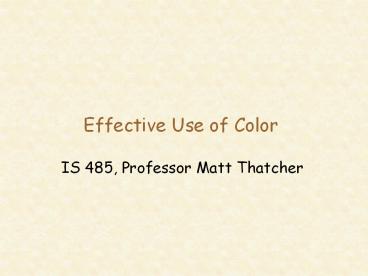Effective Use of Color PowerPoint PPT Presentation
1 / 36
Title: Effective Use of Color
1
Effective Use of Color
- IS 485, Professor Matt Thatcher
2
Agenda
- Administrivia
- Use of color in design
- Other human abilities
3
Color as a Design Element
- We wish to seek means through which the careful
use of color can enhance human performance when
dealing with computer displays - The meaningless introduction of color to an
interface can reduce user performance to 1/3 of
what it was without color
4
Physiology of the Eye
- Physical structure of the eye
- Limits of perception
- Guidelines for use of color
5
Physiology of the Eye
- Lens is not color corrected
chromostereopsis, produces 3D effect
Lens
White Light
Retina (separated wavelengths)
6
Lens
Focus on Red Light
Retina
Lens
Focus on Blue Light
Retina
7
Implication of Chromostereopsis
- Spectrally extreme colors produce eye strain
(refocusing)
8
Visible Spectrum
9
Physiology of the Eye
- Composition of the eye (retina), wavelength
sensitivity
65
2
33
10
Physiology of the Eye
- Lens is not color corrected, Murch, 1984
- Adjacent, opposite colors produce eye strain,
Schneiderman, 1992 - Cone composition of the eye, Murch, 1984
Composition of the Eye
65
2
33
11
The Aging Process
- Lens tends to yellow and absorbs shorter
wavelengths - causing increased insensitivity to blue
- Fluids in the eye suffer from reduced
transparency - Perceive a lower level of brightness
- Implications
- dont rely on blue for text or small objects
- older users need brighter colors
12
Color Deficiency(or Color Blindness)
- Trouble discriminating colors
- Percentage of population affected
- men 8 - 10
- women 0.5 - 1.5
- Shape and contours defined by color alone can
appear invisible - Most common color deficiency
- RG!
13
Problem for Color Deficient Users
14
Color Wheel
15
Effective Color Combinations
- Opponent colors go well together
- complementary colors (RG or BY)
- Pick non-adjacent colors
16
Poor Color Contrast
17
Color Illusions
- Color adaptation
- colors appear less saturated after prolonged
exposure - McCullough effect
- shifts in color perception toward complementary
colors
18
(No Transcript)
19
Simultaneous Contrast
20
Commonality/Difference of Color by Profession
- Machine industry white hot
- Chemical engineer redhot, bluecold
- Medical green, purple tumor
- red, yellow normal
- Control engineers green safe
- Financial redloss, blackgain, green
profitable - Health care green infected
- Map makers bluewater, greenforests,
yellowdeserts - Automobile industry greengo, yellowcaution,
redstop
21
Difference of Color by Culture
Culture Red Yellow Green Blue European
danger caution,coward
safe,sour masculine Japanese anger,
danger grace,nobility youth
villany Chinese joy,festive
honor,royalty Arabic
happiness, prosperity strength
virtue,faith
22
Poor Color Coding
23
Experimental Results
24
Difference in Color
- Source of colors
- Texture or finish of surface
- Ambient light sources
- Size, orientation of surface
- Other colors in field of vision
- Distance from object
25
Color and Commercialism
- Software now evaluated based on its interface
- Competition and focus may not be functionality,
but usability
26
Review of Color Guidelines
- Avoid the simultaneous display of spectrally
extreme colors - Avoid red and green in the periphery of a
large-scale display - lack of RG cones there -- yellows blues work in
periphery - Avoid pure blue for text, thin lines, and small
shapes - Opponent (or complementary) colors on the color
wheel go well together - Older operators need higher brightness levels to
perceive and distinguish colors - Ensure that color coding supports the user and
the task - Use color as a redundant clue
27
The Best Advice
- Color can be very helpful, but
- Pay attention to
- how colors combine
- human perception
- people with color deficiency
- established color coding
- Best advice
- perform user, task, environment analysis
- conduct user tests
- use color sparingly
28
Use Color Sparingly
compared to
29
Human Abilities(Some More Interesting Stuff)
- Fitts Law
- moving hand is a series of microcorrections
- correction takes Tperception Tcognition
Tmotor 240 msec - time Tpos to move the hand (or mouse) to target
size S which is distance D away is given by - Tpos a b log2 (D/S 1)
- summary
- time to move the hand depends only on the
relative precision required
30
Fitts Law Example
- Which will be faster on average?
- pie menu (bigger targets less distance)
31
Simple Experiment
- Volunteer
- Start saying colors you see in list of words
- when slide comes up
- as fast as you can
- Say done when finished
- Everyone else time it
32
- ZYP
- QLEKF
- SUWRG
- XCIDB
- WOPR
- ZYP
- QLEKF
- XCIDB
- SUWRG
- WOPR
- SUWRG
- ZYP
- XCIDB
- QLEKF
- WOPR
- QLEKF
- WOPR
- ZYP
- XCIDB
- SUWRG
33
Simple Experiment
- Do it again
- Say done when finished
34
- RED
- BLACK
- YELLOW
- BLUE
- RED
- GREEN
- YELLOW
- BLACK
- BLUE
- BLACK
- RED
- YELLOW
- GREEN
- BLUE
- GREEN
- BLUE
- RED
- YELLOW
- BLACK
- GREEN
35
Memory
- Interference
- two strong cues in working memory
- link to different chunks in long term memory
- Why learn about memory?
- know whats behind many HCI techniques
- helps you understand what users will get
- aging population of users
36
Next Class
- Web Design Patterns (Homepage)

